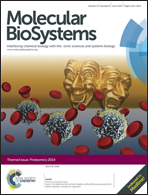Mitochondrial proteomics investigation of a cellular model of impaired dopamine homeostasis, an early step in Parkinson's disease pathogenesis†
Abstract
Impaired dopamine homeostasis is an early event in the pathogenesis of Parkinson's disease. Generation of intracellular reactive oxygen species consequent to dopamine oxidation leads to mitochondrial dysfunction and eventually cell death. Alterations in the mitochondrial proteome due to dopamine exposure were investigated in the SH-SY5Y human neuroblastoma cell line. The combination of two orthogonal proteomic approaches, two-dimensional electrophoresis and shotgun proteomics (proteomeXchange dataset PXD000838), was used to highlight the specific pathways perturbed by the increase of intracellular dopamine, in comparison with those perturbed by a specific mitochondrial toxin (4-methylphenylpyridinium, MPP+), a neurotoxin causing Parkinsonism-like symptoms in animal models. Proteins altered by MPP+ did not completely overlap with those affected by dopamine treatment. In particular, the MPP+ target complex I component NADH dehydrogenase [ubiquinone] iron–sulfur protein 3 was not affected by dopamine together with 26 other proteins. The comparison of proteomics approaches highlighted the fragmentation of some mitochondrial proteins, suggesting an alteration of the mitochondrial protease activity. Pathway and disease association analysis of the proteins affected by dopamine revealed the overrepresentation of the Parkinson's disease and the parkin–ubiquitin proteasomal system pathways and of gene ontologies associated with generation of precursor metabolites and energy, response to topologically incorrect proteins and programmed cell death. These alterations may be globally interpreted in part as the result of a direct effect of dopamine on mitochondria (e.g. alteration of the mitochondrial protease activity) and in part as the effect on mitochondria of a general activation of cellular processes (e.g. regulation of programmed cell death).

- This article is part of the themed collection: Italian Proteomics Association, 2014

 Please wait while we load your content...
Please wait while we load your content...